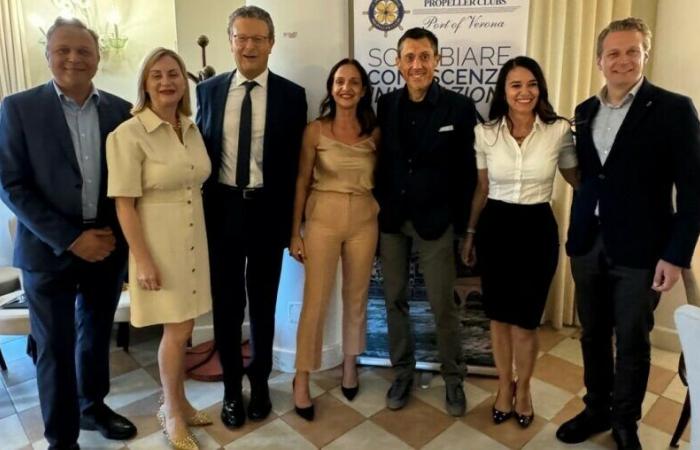Digital transformation will give new impetus to separate waste collection, reconciling the need to pursue the logic of the circular economy with the need for environmental hygiene companies to contain the high economic and industrial costs of current “door-to-door” collection systems.
This is the clear message that emerged from the discussion promoted on the occasion of the last meeting of the Propeller Clubs Port of Verona led by Chiara Tosi, and dedicated to the topic of management of hygiene and environmental protection services.
The topic was focused on by the management of Ser.it, the company controlled by Agsm Aim, which – with its 340 employees and a turnover of 40 million – deals with urban hygiene services in the territory of 58 municipalities in the Veronese area.
Guests of the evening Propeller, the general manager Maurizio Alfeo and Lorenza Davì, of the company’s management staff.
And the director Alfeo wanted to summarize his speech by speaking of a “Back to the future in sustainable separate waste collection”: “A system that in recent years has allowed us to significantly reduce landfill disposal, but which now requires a rethinking of the methods of implementation to be truly sustainable in the future. Today the percentage of separate waste collection exceeds 70 percent, an extremely positive figure, but from 2015, the year of its introduction, to today, the “door to door” has determined a series of critical issues that environmental hygiene companies must deal with.
At Ser.it, for example, we had to double the number of operators to cover the service, with a consequent increase in costs.
We then think that the system is based in practice on the good will of the citizen who decides whether or not to practice waste separation based on his civic sense. Which is to say that we are entrusting a business worth 400 million to “volunteering” – so much so at a provincial level for waste disposal”.
Then there is the aspect of the impact of “door to door” on the collection workers, an aspect that was addressed in a specific study by Ser.it, illustrated by Lorenza Davì: “This collection method, which involves the the operator’s descent from the vehicle at each house number, the throwing of the bags deposited by the citizens into the compactor vehicle, the re-entering of the cabin and then moving to the next point where to repeat the operation, has generated serious pathologies in the operators assigned to the collection, increasing requests for occupational diseases exponentially.
At Serit we have reached 30% of employees who are unfit for the service.
An unsustainable situation, since it is unacceptable that there is a manual job where the danger to the health of the worker is now well-known, even if this has had over the years the positive counterpart of the increase in the percentage of separate waste collection with the consequent environmental benefit”.
Here is the “back to the future” that director Alfeo was talking about: “The path to follow will be the one offered by technology, that is, the adoption of smart bins.
The street bins will therefore be repositioned, but with one important difference: citizens’ access to the disposal will be controlled.
The citizen will only be able to pay what he gives, and the more he differentiates the less he pays, thus adding an economic motivation to the civic one.



